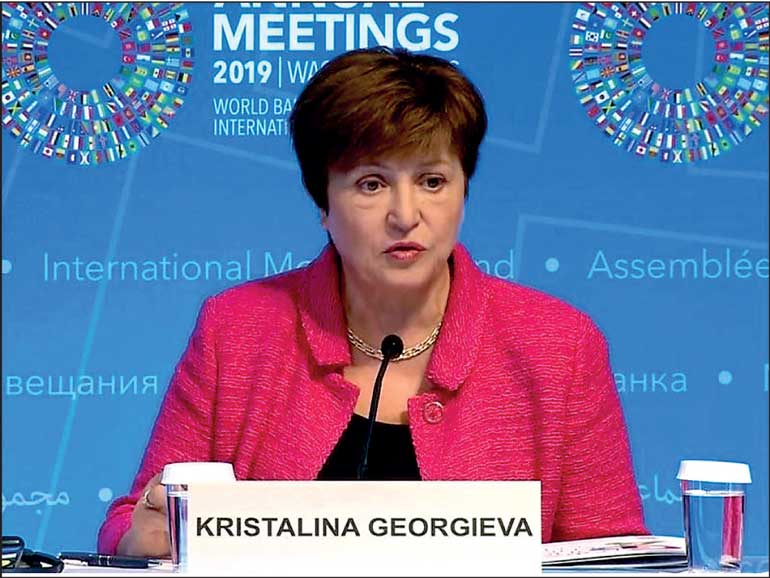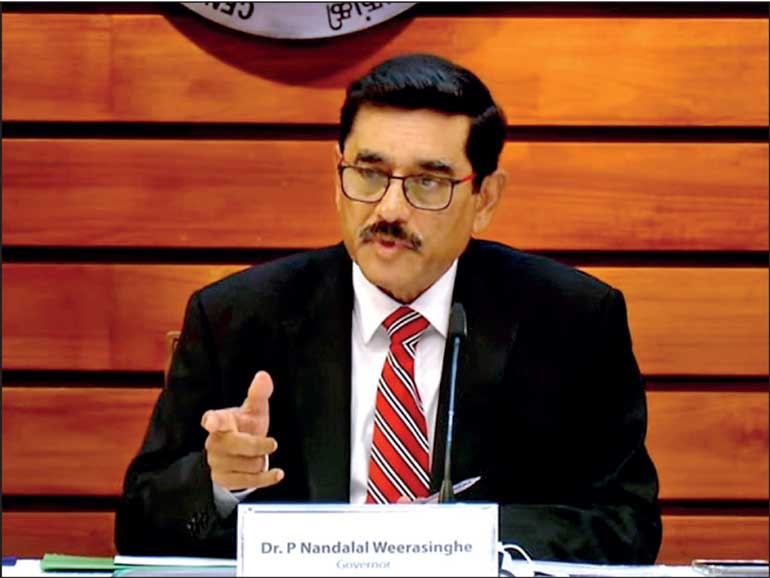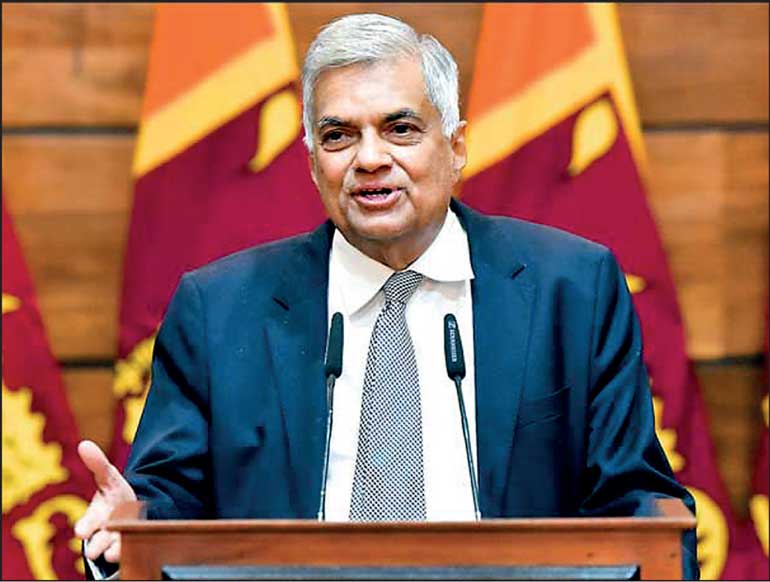Sunday Feb 22, 2026
Sunday Feb 22, 2026
Monday, 3 April 2023 00:01 - - {{hitsCtrl.values.hits}}

IMF Managing Director Kristalina Georgieva

Central Bank Governor Dr. Nandalal Weerasinghe

President Ranil Wickremesinghe
 Three continuing conditions for EFF
Three continuing conditions for EFF
Three conditions which the Sri Lankan Government should meet before end-June 2023 to receive continued assistance from the recently approved bailout package of $ 3 billion seem to have been extraordinary to many observers of IMF’s global operations. They are the establishment of proper governance systems, introduction of strong anti-corruption mechanisms, and enacting a new law to make the central bank an autonomous institution.
The first two are interrelated and the third one supports the first two. Their importance was highlighted by IMF’s Managing Director Kristalina Georgieva in the press release announcing the bailout package as follows: “The ongoing efforts to tackle corruption should continue, including revamping anti-corruption legislation. A more comprehensive anti-corruption reform agenda should be guided by the ongoing IMF governance diagnostic mission that conducts an assessment of Sri Lanka’s anti-corruption and governance framework. The authorities should step up growth-enhancing structural reforms with technical assistance support from development partners.”
Sri Lanka: Weak governance, anti-corruption and central bank
The governance and anti-corruption laws have been further emphasised in the report submitted to the Executive Board of the Fund seeking the approval of the bailout package. The Fund has noted that Sri Lanka’s governance has been weak in several state functions and there is high level of corruption in the system. Accordingly, a governance diagnostic mission has been fielded by the Fund to Sri Lanka to assess the adequacy of governance and anti-corruption laws. The report will be published in September 2023 providing guidelines for the Sri Lanka Government to introduce necessary changes in these areas. The anti-corruption legislation should be in line with the United Nations conventions against corruption and should include provisions for asset declaration and asset recovery if such assets have already been siphoned out of the country.
The government seems to take credit for this as was announced by President Ranil Wickremesinghe, though it is being introduced not on its own accord but on the insistence of IMF for continued support. Likewise, the Central Bank is to be made autonomous not on its own accord but due to the pressure from the Fund to make it free from political interferences that lead to the decline in the value of money. It is unfortunate that an outside institution should advice Sri Lanka as to how it should introduce new laws relating to these vital issues.
Governance is a concept involving how a country is governed and it includes how economic policies are made and implemented, what type of regulatory framework is available and adherence to rule of law. Sri Lanka is weak in all these three aspects, especially matters relating to the rule of law. All successive governments have been using the law partially favouring their supporters and applying strictly on others. It will be interesting to learn what type of findings will be made by the visiting team on assessing the diagnostics of governance in the country relating to the rule of law
IMF and Russian fiasco of 1990s
But IMF has a very good reason to insist that its borrowers should have a good governance system, strong anti-corruption laws, and an independent central bank after it burned its fingers in 1990s by lending an enormously high amounts of money to Russia on the pressure brought on it by the United States. The US government wanted to help Boris Yeltsin to rebuild Russia in line with the ideologies of the Western nations. As a result, when the IMF staff and the Executive Board were willing to lend only modest amounts to Russia, the pressure was brought on the Fund to lend extraordinarily large amounts by way of bailout packages. Deviating from the normal practice of providing its funds only for balance of payments purposes, IMF allowed the Boris Yeltsin administration to use for budgetary purposes as well. This paved way for the Russian government to misspend the money it receives from IMF.
Similarities between lending to Russia and Sri Lanka
There are certain similarities between IMF’s lending to Sri Lanka today and its lending to Russia in 1990s. After the collapse of the Soviet Union in 1991 and a new nation called Russian Federation was born, it was necessary for IMF to step in and help the new nation to thrive as a free market economy. Like Sri Lanka, Russia was a bankrupt nation with foreign debt contracted by the old Soviet Union amounting to some $ 66 billion. But its foreign reserves, including the gold reserves, were only $ 2 billion. As a result, Russia was about to default its foreign loan obligations to the financial institutions in the West.
Same as in Sri Lanka today, IMF stepped in as the policy advisor, lender, and the arranger of support from Western countries. IMF was so enthusiastic about its new role that the program was started even before Russia was formally admitted as a member. But that was formalised after Russia gained IMF membership in June 1992.
IMF’s three blunders in Russia
Writing on the IMF’s failure in Russia in 1990s, a paper published by Heritage Foundation in 1998 has identified three blunders committed by the Fund in its enthusiastic lending to Russia (available at: Russia’s Meltdown: Anatomy of the IMF Failure | The Heritage Foundation). First, there was an inadequate risk assessment by IMF about its borrower which every bank does even for small loans granted by it. In this connection, one serious mistake was the overestimation of the growth rate of Russia after 1994. Second, the Fund had committed its funds to Russia betting on the will and ability of the leadership implementing the reforms that had been recommended by it. No allowance had been made for the possibility of Russian leadership being unwilling or unable to implement those reforms. As a result, there was no Plan B if Plan A was not successful.
Third, IMF had failed to do the necessary due diligence about the quality of Russian leaders who would succeed the existing leaders should they leave their positions midway through. This was like a situation where the top executives of a company leaving it immediately after a loan has been approved by a bank. It would have been clear to the IMF officials that some of the tough reforms would not have passed through the anti-reform lower house of Parliament, known as Duma. But it was exactly what happened.
Money lent to Russia disappearing without a trace
The problem with IMF officials was that they had ignored the high level of corruption in the government. According to the report mentioned above, $ 250 million lent to Russia by the World Bank to restructure the coal industry and an undisclosed amount of dollar loans supplied for rehabilitating Chechnya have disappeared without a trace. In addition, according to reports, a vast sum of money had been siphoned off by corrupt politicians who had been supported by central bank officials through the US bank, Bank of New York, or BNY.
Leaving the moneys lent to Russia off its shores
According to the Corruption Watch released by Radio Free Europe Radio Liberty or RFERL on 27 June 2002 (available at: https://www.rferl.org/a/1342417.html), the scandal connected with the disappearance of the IMF funds had not been over even as late as 2002. In April that year, the head of the State Audit Chamber, Sergei Stepashin, had confessed that he did not know the whereabouts of almost $ 5 billion received as a loan in 1998 to support banks like SBS-Agro, in Russia. He had said that money had really dissolved or more precisely, the loan from IMF had simply been stolen. He had said that it would have been done by the top officials implying those at the central bank. Many banks from Frankfurt to Australia to USA had been involved in these illegal transactions.
First, $ 2.35 billion had been transferred from the foreign branch in Frankfurt of the Bank of Russia to the Bank of Sydney in Australia. It is from this account that money had been disbursed to bank accounts in other countries. $ 235 million to the account of an Australian company, $ 2.115 million to National Westminster Bank in London, $ 1.4 billion to the Bank of New York, $ 780 million to Credit Suisse, and the remaining $ 270 million to Kreditanstalt-Bankverein in Austria. This roundabout method of sending money illegally to its destination by employing several banks in several countries was successful in hiding the unauthorised transactions from the audits of the Fund.
It was simply satisfied that it was a legitimate transaction because money had been transferred by the Bank of Russia to its own branch in Frankfurt. This complacence had helped those in the Russian central bank and the Boris Yeltsin administration to systematically steal the IMF money without its knowledge. As a result, IMF management refused to accept that its money had been misspent by Russian authorities. Instead, according to them, the IMF loan proceeds had been used to defend the Ruble, the explanation given by the Bank of Russia officials. Over the period, the Bank of New York had received an estimated sum of $ 22.5 billion. In 2007, the Russian government had sued the Bank of New York demanding that it should return this money to Russia (available at: https://www.reuters.com/article/us-russia-bank-lawsuit-idUSL175611720070517).
The new bill to make the Central Bank independent seems to be an eyewash. The bill has boldly pronounced that the Central Bank is administratively and financially autonomous. This refers to the bank’s budget independence. While the budget independence is necessary, the more applicable independence relates to the autonomy in its policy making. The bill is silent on it
But in 2009, due to some unknown reasons, Russia dropped this legal case and accepted only the legal costs from the Bank (available at: https://www.cnbc.com/2009/10/22/russia-drops-225-billion-suit-against-bny-mellon.html). However, according to the London-based The Guardian, IMF’s top officials had known about the Bank of Russia placing IMF loan proceeds with its subsidiaries overseas and had just advised it that it was not a good practice (available at: https://www.theguardian.com/world/1999/oct/17/russia.business ). Again, it is a callous approach to news about its loan money being pilfered by those in the central bank and the Yeltsin administration.
IMF is wiser now: Once bitten twice shy
Since the Russian scam of 1990s, IMF has become wiser. Before lending to any country, it does a routine check on the governance system, anti-corruption machinery, and the central bank autonomy to ascertain whether they are adequate to protect the moneys lent to these countries. That is why all these three aspects have been made a continuing condition for Sri Lanka to receive the next instalment of the approved EFF. If there are deficiencies in the governance system, Sri Lankan authorities should take immediate action to rectify them. In a fact sheet issued by IMF (available at: https://www.imf.org/en/About/Factsheets/The-IMF-and-Good-Governance), it has been noted that good governance and sustainable development are interrelated.
Accordingly, governance is a concept involving how a country is governed and it includes how economic policies are made and implemented, what type of regulatory framework is available and adherence to rule of law. Sri Lanka is weak in all these three aspects, especially matters relating to the rule of law. All successive governments have been using the law partially favouring their supporters and applying strictly on others. It will be interesting to learn what type of findings will be made by the visiting team on assessing the diagnostics of governance in the country relating to the rule of law.
There are two main initiatives which IMF is promoting in member countries in this respect. The first relates to the management of public resources through reforms covering public sector institutions. The other is concerned with the development and maintenance of a transparent and stable economic and regulatory environment conducive to private sector activities. It is widely held that both are missing in Sri Lanka.
Strengthen the corruption combating machinery
IMF through its EFF has stepped in when there is a need for a strong anti-corruption machinery in Sri Lanka. The existing bribery or corruption commission is weak, politicised, understaffed, and no teeth to bite top politicians and those who are related or connected to them. IMF has insisted that new laws should be enacted to give additional teeth to the machinery in line with what is recommended by the UN system. The new machinery should conduct investigations into bribery or corruption on its own rather than waiting for someone to make a complaint. Also, it should have provisions to bring back the money siphoned off the country. IMF failed in this respect in Russia. It cannot fail again in the case of Sri Lanka.
IMF through its EFF has stepped in when there is a need for a strong anti-corruption machinery in Sri Lanka. The existing bribery or corruption commission is weak, politicised, understaffed, and no teeth to bite top politicians and those who are related or connected to them. IMF has insisted that new laws should be enacted to give additional teeth to the machinery in line with what is recommended by the UN system. The new machinery should conduct investigations into bribery or corruption on its own rather than waiting for someone to make a complaint. Also, it should have provisions to bring back the money siphoned off the country. IMF failed in this respect in Russia. It cannot fail again in the case of Sri Lanka
New central bank bill needs a major overhaul
The new bill to make the Central Bank independent seems to be an eyewash. The bill has boldly pronounced that the Central Bank is administratively and financially autonomous. This refers to the bank’s budget independence. While the budget independence is necessary, the more applicable independence relates to the autonomy in its policy making. The bill is silent on it. The Secretary to the Ministry of Finance, the main causal agent of subduing the bank’s independence is no more on the Governing Board or the Monetary Policy Board. But according to the proposed law, both boards are going to be filled by nominees of the minister of finance who has a vested interest in bringing the Central Bank under his control.
In the current Monetary Law Act, there are nominees of the minister on the Monetary Board. In the proposed law, there are still nominees of the minister on both governing boards of the bank, in addition to the two Deputy Governors who are actually appointed by him. Hence, if the present Monetary Board is not independent, so is the two boards to be set up under the proposed law. What is suggested is that instead of the minister of finance nominating these members, let a selection process be introduced under which suitable persons are nominated, screened, vetted by a selection board and three names are presented to the appointing authority for selecting one person out of them.
In any case, the minister of finance should not be empowered to appoint Deputy Governors as has been proposed in the new law. That should be done by the Governing Board based on the merit of the persons so appointed.
If the central bank bill is enacted as it is, IMF will be fooled once again as it had happened in the case of the Russian scam of 1990s.
(The writer, a former Deputy Governor of the Central Bank of Sri Lanka, can be reached at [email protected].)